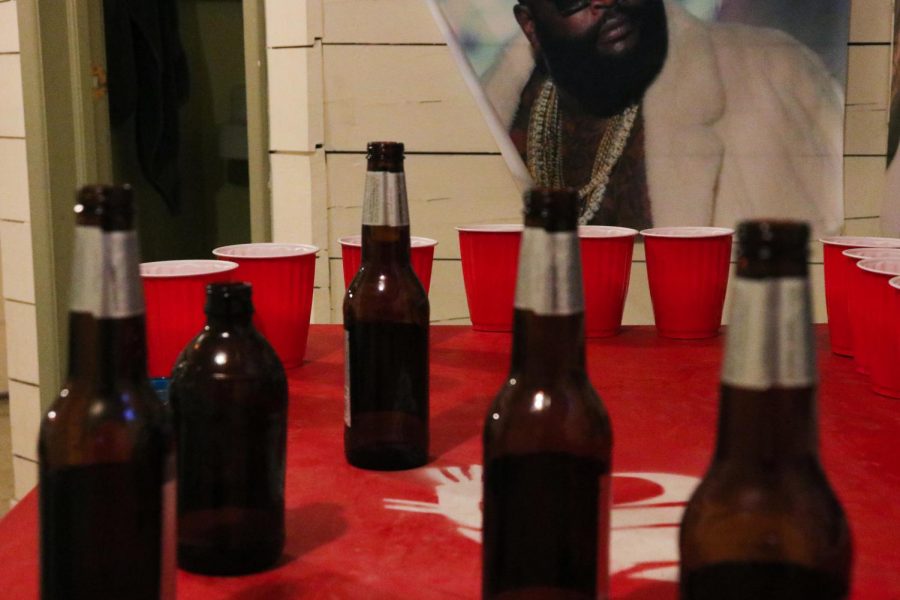Change WSU reputation, no alcohol at games
Alcohol should not be offered at WSU sports venues, potentially harmful to perception as research institution
JACK LEWIS-CLARKE | EVERGREEN PHOTO ILLUSTRATION
One long-term goal at WSU is to be best known as one of the top 25 research universities nationally instead of as a party school. Keeping alcohol out of our sporting events prevents this reputation from being made even more public.
March 26, 2019
A riot occurred when WSU became a dry campus and for twenty years administrators upheld that policy. Yet to fully commit to keeping alcohol off campus and work toward a reputation of research, we must make our sporting events dry as well.
The alcohol policy is far from outdated and should be kept as is. How it’s enforced now will have a serious impact on our university’s future. WSU administrators are trying to reshape the university academic image while at the same time revisiting the idea of expanding alcohol sales at Martin Stadium.
While alcohol sales may provide short-term economic benefits, serving alcohol at games is counterproductive to WSU’s long-term plans and will have negative consequences down the line.
ASWSU Vice President Tyler Parchem has insight into WSU’s long-term goals and knows where it’s headed.
“WSU is now on the ‘Drive to 25,’ ” Parchem said. “We want to be a research institution, but there is this past history of WSU being a party school.”
The “Drive to 25” is WSU administrators’ pursuit of becoming one of the top 25 public research universities in the nation by 2030. While still a long way off, steps are being taken now to improve the public image of our school to seem more professional.
“In recent years there has been a push to move away from saying ‘Wazzu’ because there is negative party connotations with that,” Parchem said.
It would be good to lose a tainted nickname, but people need to see more change than just correcting phrases.
Telling the public in a press release most students won’t read will not help WSU recruit more students interested in research who would carry WSU to the goal. Our sporting events are where we receive the most publicity, so it is important that we present our school well at these times.
Though alcohol sales can be a huge cash cow at athletic events, they set a poor example of how prospective students should see the university. Any changes made to help shape the future of our school will be constantly undermined by vocal students who enjoy binge drinking and reckless behavior being broadcasted at our sporting events.
Changing the image of WSU gives our school more credibility as an academically intensive school, giving us more opportunities for grants and other funding. This would easily rival the economic benefits of allowing alcohol to be sold at our sporting venues.
There are plenty of universities that balance the image of a place to party and still are a respected institution of research, so alcohol isn’t the sole cause of our image issues. Attempting to change student culture only alienates students from their university and plenty of students who party push themselves to succeed.
Our school can have a party atmosphere and challenge students academically, but people need to see which of these we put first. By promoting the research done by WSU, we can show how not every important accomplishment done at WSU is finishing a Smirnoff Ice before the snap or winning a sports title.
We need to distance the university from its party-hard reputation and the best way to further separate it is to keep our sporting events clear of alcohol.






















Bob Giantonio • Mar 28, 2019 at 9:11 am
There was not a riot when WSU opted to become a dry campus.
Bowe • Mar 26, 2019 at 6:32 pm
Drinking age is 21. Most undergrad students are 18 – 20… Limiting sales of alcohol at games will have next to no impact on the reputation of the school. Seems like you should research other schools and the impact before implementing since you want to tack course and make it a research University.
Tom Marier • Mar 26, 2019 at 5:03 pm
Let’s be realistic here. It’s not just students who attend games. Alumni and adults attend games as well and quite frankly, THOSE are the people who pay DECENT money for the expensive seats, which helps pay for a lot of the entire cost of the ENTIRE athletic department budget. Football games typically make money – basketball is supposed to – although recently at WSU, that hasn’t been the case. Most of the other sports LOSE money – they cost more money than they bring in at the gate. If you start giving adults with spendable money in their pockets a reason NOT to come to football games, there will be a HUGE ripple effect on the entire athletic department – which is NOT what is needed at this point in time. If you want to cut down on alcohol-related problems and trust me, every university has them, then be creative and come up with some other solutions without hurting the athletic department – which needs every dollar that it can extract from every person willing to attend a game.
Steve Grover • Mar 26, 2019 at 4:36 pm
Having a beer at a football game is fun. 99% of those who have a beer do not abuse this privilege.
It does not make WSU a party school. By far the majority of the people at football games are not students. So bring in on and let people have fun. It is not going to hurt the school in any way.